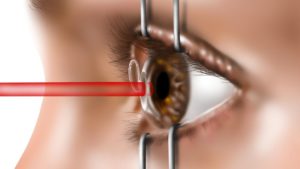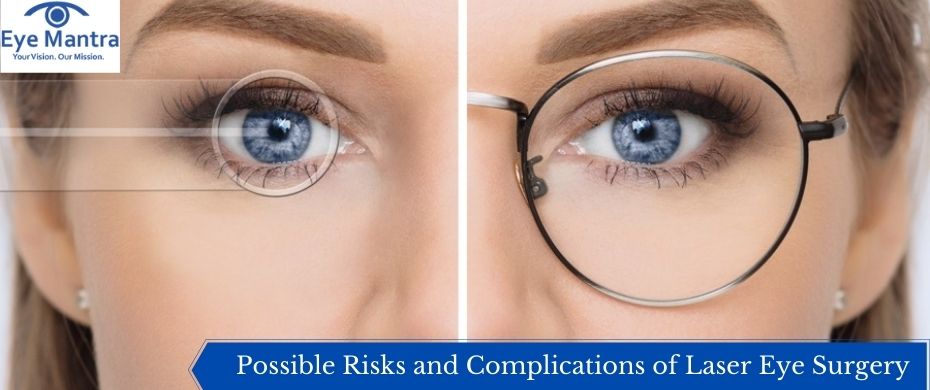Contents
Is LASER Eye Surgery Safe?
A good vision is one of the most precious and important senses for humans. Everyone wants to see this beautiful world. People with eye disorders go through the inconvenience of wearing eyeglasses and lenses to see well. Laser eye surgery is a one-time process that can change your vision forever.
LASER stands for ‘’Light Amplification by the Stimulated Emission of Radiation’’. In this type of vision correction surgery, specific light beams and radiations are a tool in the surgical process instead of physical surgical tools. Laser eye surgery can bring back 20/20 vision (i.e. normal vision). Laser eye surgery is a safe surgical procedure operated to correct long-sightedness, shortsightedness, astigmatism, or even presbyopia.
Surgery Procedure

Laser eye surgery is performed in a maximum of 20 minutes. The patient stays awake during the surgery but some anesthesia is given to calm the nerves and pain in the eye if any. To avoid any injury or error during surgery, a laser is designed to stop the surgery immediately if the patient’s eye makes any sudden movement. In this surgery ‘an excimer’s laser is used to remove the unwanted tissue from the cornea, which brings back the focus of light rays onto the retina and improves vision.
Eligibility for LASER eye surgery?
- The laser is one effective method to correct refractive error. Any person above 18 can get a laser done.
- A person with serious eye diseases like glaucoma, or diabetes (Online Diabetes Treatment), is not eligible for surgery. These diseases can further complicate the surgery.
- Not everyone is suitable for laser surgery for example patients above 40 may have presbyopia which can make the lens stiff. Laser surgery can reshape the cornea but not the lens.
- A person below 18 can’t get surgery because our eyesight keeps changing at that age.
- A pregnant lady is also advised not to get operated on before the child’s birth.
- Another reason that you could not be the right candidate for laser eye surgery is the thin cornea. If you have a thin cornea it’s hard to cut a flap therefore, surgery cannot be performed.
- Eye power plays a role in laser surgery if you have a thin cornea. Eye power is measured in Dioptre. For example, a person with 7D and thick cornea is eligible for laser eye surgery. But a person with-4D and thin cornea is not an eligible candidate.
Even if you do not fall under any of those above-mentioned criteria, you still might not be compatible with laser surgery. The best way to know is to get your eyes checked up, then ask your surgeon. If your surgeon does not find you compatible for any reason. Take it seriously. And opt for other treatments.
Types of Laser eye surgery
LASIK Surgery
‘Laser-Assisted in Situ Keratomileusis’ is the most performed surgery for treating farsighted, nearsighted, astigmatism patients. In this surgery, a small flap of very thin corneal tissue is made, and the laser is beamed upon the exposed tissue for reshaping. Then the flap is put back on the cornea. To minimize the healing time, a little part of this small flap is kept attached to the cornea from the beginning to reposition it the same.
LASEK Surgery
‘Laser Epithelial Keratomileusis’ is a type of laser treatment used to treat mild and average myopia (nearsightedness). In LASEK surgery, a flap is created of the epithelium layer of the cornea; exposed tissue is treated with a laser just like in LASIK surgery followed by the reposition of a flap of epithelium tissue. After the surgery, patches are taped on your eyes to protect the layer as it heals.
PRK
‘Photo Refractive Keratectomy’ is the laser surgery under which the whole epithelium layer is removed to expose the area and then your cornea is reshaped. This surgery is done on a patient who has a weak prescription. The healing time for PRK surgery is at least 1 weak.
SMILE
‘Small Incision Lenticule Extraction is the most advanced type of laser surgery. During SMILE laser eye surgery a microscopic key-whole is created to your cornea and then the exposed part is reshaped with laser beams. No flap or removal of epithelium is done. This is the most liked laser surgery for refractive error correction.

Risks & complications of LASER eye surgery
Laser is the safest and effective procedure for eye corrective. Risk and complications under laser surgery are very rare. Any the eye problems like itchiness or dry eye issues that occur after surgery are after-effects of the surgery and will heal after some time. However, it’s our important to know all the possible risk before the surgery.
- You may not experience complete refractive error correction. In this case, you will have to go for an enhancement procedure (another surgery) or you may go for contact lenses or glasses.
- Dry eyes issue- Laser eye surgery, affects the film that produces tears, so it may take weeks or even months after surgery to heal it. However, dry eyes after surgery are normal. But if you’re already suffering from dry eye issues then go for SMILE instead of LASIK.
- Vision loss- After laser eye surgery some people may not see as sharp as they are supposed to. But it will most likely restore within 3-6 months.
- If you’re scared about blindness after surgery then don’t be. But if you don’t follow precautions after the surgery then the risk of infections increases and delays your healing process.
Post LASER surgery precautions
Laser eye surgery is safer for people who take essential precautions after the surgery. Results will be positive and your healing process will be faster if you protect your eyes from all the possible potential risks and infections.
After the surgery, you may feel some itchiness in the eye. You might experience a sudden urge to rub your eyes. You will have to resist touching your eyes at all costs as it can displace your corneal flap. In most cases, these symptoms disappear within an hour or two. Squeeze the eye drops from time to time prescribed by the doctor to keep your eyes moist and avoid any inflammation. Keep the shield on your eyes after surgery for some days especially while sleeping to avoid rubbing and hurting your eyes while you are sleeping. Always wear sunglasses in the sunlight for some days after surgery.
Conclusion
The aim of any eye corrective is to see well. If you want to avoid the hassle of wearing eyeglasses and contact lenses. Go ahead with laser eye surgery. The chances of failure of laser eye surgery are almost null. Do thorough research, choose an experienced surgeon, take an eye examination. And last but not least follow all the precautions & prescriptions before and after surgery for quick, positive results. Laser eye surgery is the journey from spectacles to no spectacles.



